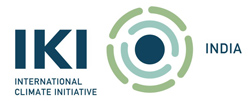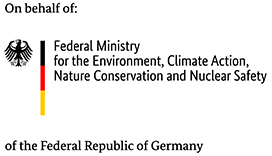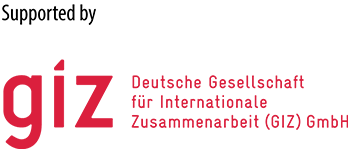IKI Priorities in India
IKI projects in India contribute to the primary objectives and focus areas of IKI- climate change mitigation, adaptation to the impacts of climate change, conserving forests and natural carbon sinks and the protection of biological diversity.
Mitigation of Climate Change

IKI provides support for developing and implementing innovative instruments for mitigating their greenhouse gas emissions. The IKI also supports the development of systems for measurement, reporting and verification (MRV) of greenhouse gas (GHG) emissions and mitigation activities. A large number of projects also pursue the goal of mobilising public and private capital for climate change mitigation. The mitigation funding area addresses policy consulting, capacity building and training measures, as well as cooperation on technologies.
Adaptation to Climate Change

Adaptation to climate change is a topic of increasing global importance as many of the negative impacts of climate change on nature and human society are now unavoidable. Extreme weather events such as flooding, hurricanes or heatwaves are on the rise globally and in India in particular. In the funding area "Adapting to the Impacts of Climate Change", the IKI is supporting particularly vulnerable countries and regions in increasing their capacity to adapt to the effects of climate change. The support focuses on ecosystem-based adaptation (EbA), as part of larger-scale adaptation planning, ecosystem-based measures combine climate change impact adjustment and biodiversity conservation, and such solutions are often less expensive than those provided by technological approaches. IKI also supports instruments for the risk management of climate-related extreme events, such as innovative insurance solutions, as well as the development and implementation of national adaptation strategies.
Conserving Forests and Natural Carbon Sinks

IKI supports partner countries in implementing the international mechanism for reducing emissions from deforestation and forest degradation in developing countries (REDD +) as well as projects to support the approach of forest and landscape restoration (FLR) as part of the Bonn Challenge. IKI focuses on the implementation of national REDD + and FLR strategies, especially within the framework of the implementation of the NDCs, and in particular on the support of sustainable business models and the mobilization of private investments. Synergies between forest protection and conservation of biological diversity play an important role along with emissions reductions and adaptation to the impacts of climate change.
Protection of Biodiversity

In the area of protection of biodiversity, IKI supports partner countries to implement the targets of the Strategic Plan for Biodiversity 2011-2020 (Aichi Targets) of the International Convention on Biological Diversity (CBD). Many IKI projects are also contributing to conservation efforts. By providing investments, advice to governments, technology transfer and research partnerships, IKI projects improve the abilities of both governments and civil society to implement the CBD in partner countries. A particular focus is the drafting and implementation of national biodiversity strategies and action plans (NBSAPs). Other focal points include the conservation, expansion and connection of protected areas, the sustainable use of ecosystems, and reductions to the degradation, fragmentation and valuation of ecosystems. The concept of ecosystem-based adaptation as well as sustainable methods of production, biodiversity-friendly agriculture and sustainable fishing are other important thematic areas. Urban biodiversity is also becoming increasingly significant.
Copyright © 2026 All rights reserved




